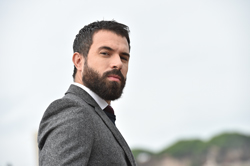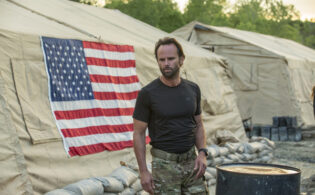 Over the last year, HISTORY has made a big bet on evolving its programming strategy, announcing a number of high-profile scripted events. Coming to the channel in 2017 is Knightfall, executive produced by Jeremy Renner and telling the story of the fall of the Knights Templar. Leading the big-budget show’s international cast is Tom Cullen, best known for his work on Sky’s The Five and ITV’s Downton Abbey. Cullen tells World Screen about landing his dream job, his love of history and the opportunities he’s finding in the TV drama landscape today.
Over the last year, HISTORY has made a big bet on evolving its programming strategy, announcing a number of high-profile scripted events. Coming to the channel in 2017 is Knightfall, executive produced by Jeremy Renner and telling the story of the fall of the Knights Templar. Leading the big-budget show’s international cast is Tom Cullen, best known for his work on Sky’s The Five and ITV’s Downton Abbey. Cullen tells World Screen about landing his dream job, his love of history and the opportunities he’s finding in the TV drama landscape today.
WS: Why did you want to be part of Knightfall?
CULLEN: Honestly, it’s my dream job. It’s something that as a kid I always wanted to do—play a knight and ride horses and fight with a sword. It’s an exciting, thrilling, high-octane piece of television that I think will appeal to a lot of people. And I know it would appeal to me if I weren’t in it. It’s about the Knights Templar, which I’m sure a lot of people have a lot of information and their own ideas about. The show is about the deconstruction of that history. It’s not set during the Crusades; it’s set in Paris 15 years after they lost Acre, their last stronghold in the Holy Land. And it’s about the fall of the Templars. The series will at some point reach Friday the 13th [of October, 1307], which is when the Templars in Paris were dissolved. I play Landry, who is unexpectedly thrust into becoming the leader of the Templars. It’s about his journey. He’s a guy who is struggling with his faith and his position inside the Templars. He blames himself for losing the Holy Grail and the Holy Land, and has spent 15 years looking for some kind of retribution or redemption, and he’s unable to do that. And suddenly it’s whispered that the Holy Grail is still around, so he goes on a hunt to try to find it while also battling his inner conflicts.
WS: What was the preparation process like for you, both in terms of historical research and the physical training?
CULLEN: When doing a historical piece like this, you have to do a lot of groundwork. You have to know the territory you’re standing on. You have to be very respectful of that history. That was a fascinating process. I often wondered if it would be grueling, but it wasn’t. It was incredibly fun delving into the world of these men. Physically it was very tough. I had to wear chain mail nearly every day—I can’t even tell you how heavy it is. So physically I had to be very prepared. But I also had to learn how to horse ride and swordfight and carry myself like a man who has been to war since the age of 10.
WS: How much do the costumes and the backdrops aid you in the process of coming to grips with your character?
CULLEN: When you’re doing a period piece and almost a genre piece, you have a lot more room to play with much bigger emotions—it doesn’t have to be grounded in mumblecore realism. So you’re able to play these huge, huge moments and these huge characters. What you’re wearing and the world you live in really grounds you in something. You don’t have to act. We had the biggest sets in Europe. We built medieval Paris. Our costume designer and our makeup designer are extraordinary. You put that stuff on and you’re there. You don’t have to do anything, really. It fills you up, it aids you in stepping into these guys’ shoes. On the first day we shot on the back lot in Paris, we had 350 extras. [The producers] built shops on the set and every shop was filled and each extra had a job. So we created a community on set. I have to ride through Paris on my horse. You can’t see the cameras and it is as if you’ve just traveled back in time.
WS: Is doing period drama for a fact-based channel a different experience than something like Downton Abbey on ITV?
CULLEN: History is so important to me. As a European it vibrates in your very fibers. I have a huge amount of respect for history. And the show does too. We’ve worked very hard on making sure that everything is right. What’s fascinating is that a lot of people know a lot about the Knights Templar, but there’s a whole lot we know nothing about. And the show bridges that gap between being absolutely historically accurate and having fun and filling in those gaps. That’s what history is. History is essentially interpretation. So it’s interpretation, inside a fixed set of rules, and that’s been fun. So yes, I feel very responsible for the history, but also it’s really nice to have your say on what you think that history is.
WS: We know from producers and content executives that it is a truly great time to be in the business of drama. How has that played out for you as an actor?
CULLEN: As somebody who likes watching television, it’s a great time for television. The way it’s moving into a world where you can access anything you want at any point and you can tailor the television you want to watch, that makes it very exciting. As an actor, there’s a lot more freedom to choose stuff that you want to do. It also means there’s a lot more room for experimenting inside television now. You don’t have to make sure you hit all of these specific demographics inside one TV show as you would if you were making it on a terrestrial channel. You can really push every facet of the TV show as far as you want. That’s exciting as an actor, because I don’t have to play it safe. That’s thrilling.


